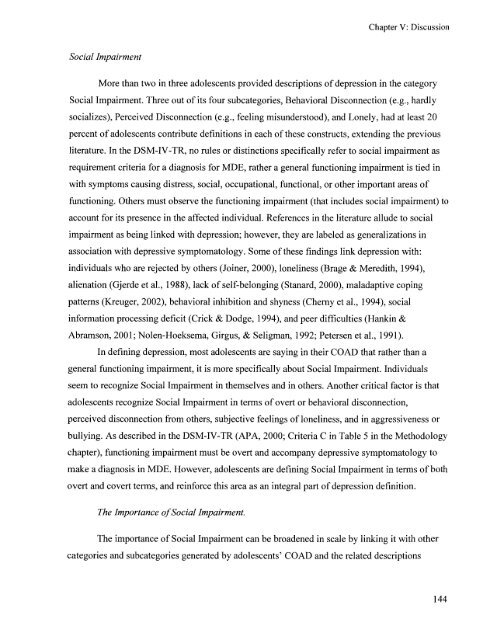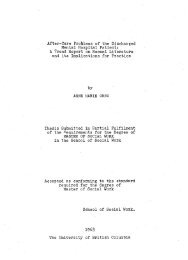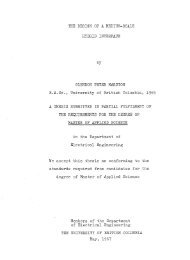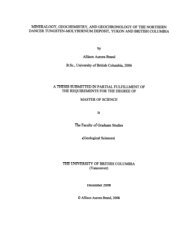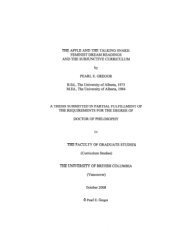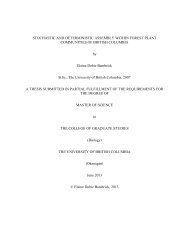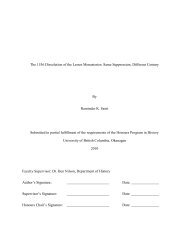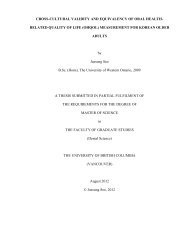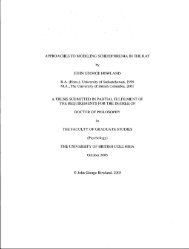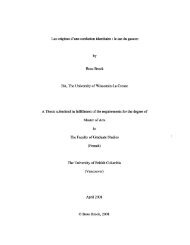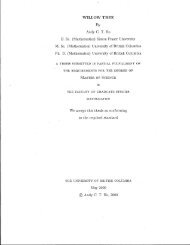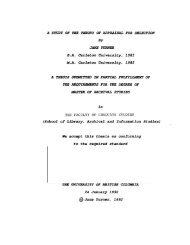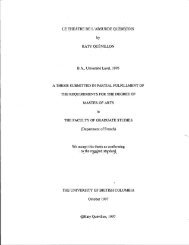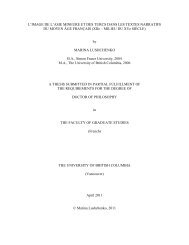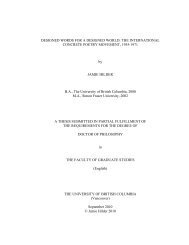how do adolescents define depression? - cIRcle - University of ...
how do adolescents define depression? - cIRcle - University of ...
how do adolescents define depression? - cIRcle - University of ...
You also want an ePaper? Increase the reach of your titles
YUMPU automatically turns print PDFs into web optimized ePapers that Google loves.
Social Impairment<br />
Chapter V: Discussion<br />
More than two in three a<strong>do</strong>lescents provided descriptions <strong>of</strong> <strong>depression</strong> in the category<br />
Social Impairment. Three out <strong>of</strong> its four subcategories, Behavioral Disconnection (e.g., hardly<br />
socializes), Perceived Disconnection (e.g., feeling misunderstood), and Lonely, had at least 20<br />
percent <strong>of</strong> a<strong>do</strong>lescents contribute definitions in each <strong>of</strong> these constructs, extending the previous<br />
literature. In the DSM-IV-TR, no rules or distinctions specifically refer to social impairment as<br />
requirement criteria for a diagnosis for MDE, rather a general functioning impairment is tied in<br />
with symptoms causing distress, social, occupational, functional, or other important areas <strong>of</strong><br />
functioning. Others must observe the functioning impairment (that includes social impairment) to<br />
account for its presence in the affected individual. References in the literature allude to social<br />
impairment as being linked with <strong>depression</strong>; <strong>how</strong>ever, they are labeled as generalizations in<br />
association with depressive symptomatology. Some <strong>of</strong> these findings link <strong>depression</strong> with:<br />
individuals who are rejected by others (Joiner, 2000), loneliness (Brage & Meredith, 1994),<br />
alienation (Gjerde et al., 1988), lack <strong>of</strong> self-belonging (Stanard, 2000), maladaptive coping<br />
patterns (Kreuger, 2002), behavioral inhibition and shyness (Cherny et al., 1994), social<br />
information processing deficit (Crick & Dodge, 1994), and peer difficulties (Hankin &<br />
Abramson, 2001; Nolen-Hoeksema, Girgus, & Seligman, 1992; Petersen et al., 1991).<br />
In defining <strong>depression</strong>, most a<strong>do</strong>lescents are saying in their COAD that rather than a<br />
general functioning impairment, it is more specifically about Social Impairment. Individuals<br />
seem to recognize Social Impairment in themselves and in others. Another critical factor is that<br />
a<strong>do</strong>lescents recognize Social Impairment in terms <strong>of</strong> overt or behavioral disconnection,<br />
perceived disconnection from others, subjective feelings <strong>of</strong> loneliness, and in aggressiveness or<br />
bullying. As described in the DSM-IV-TR (APA, 2000; Criteria C in Table 5 in the Metho<strong>do</strong>logy<br />
chapter), functioning impairment must be overt and accompany depressive symptomatology to<br />
make a diagnosis in MDE. However, a<strong>do</strong>lescents are defining Social Impairment in terms <strong>of</strong> both<br />
overt and covert terms, and reinforce this area as an integral part <strong>of</strong> <strong>depression</strong> definition.<br />
The Importance <strong>of</strong> Social Impairment.<br />
The importance <strong>of</strong> Social Impairment can be broadened in scale by linking it with other<br />
categories and subcategories generated by a<strong>do</strong>lescents' COAD and the related descriptions<br />
144


